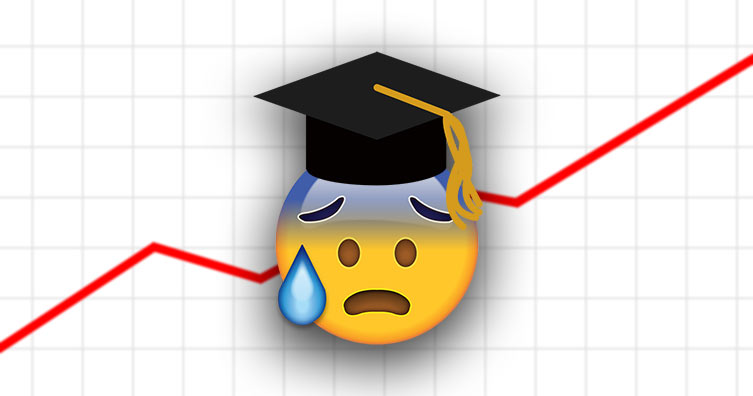Student loan interest rates set to increase AGAIN to 6.3%
This September, the interest charged on your student is set to rise to 6.3% – but it sounds worse than it is. We'll tell you why!

It feels like it was only last week that we were able to give you some good news about student loans (and to be fair, it was actually only two weeks ago).
But as always seems to be the case with student loans, it's another case of one step forward and two steps back, as today there's yet more bad news for students and graduates.
You may not know this, but every September the interest rate on your student loan changes. This is partly calculated using something called RPI (retail price index).
Without going into too much boring detail, RPI is basically based on the increase (or decrease) in the average price of goods such as bread, gin and even cycling helmets.
Each September the RPI figure from March is used to calculate how much interest will be paid on student loans for the upcoming year.
Last year RPI was 3.1%, but today's announcement of the March RPI figure has seen that figure climb to 3.3% - which means yet another increase on your student loan interest, and in turn an increased amount of debt for you to pay back.
How will the new interest rate affect your student loan repayments?

Credit: 20th Century Fox
RPI is just one element of how student loan interest is calculated, but the specifics depend on when you went to uni.
The student loan repayment situation for 2018 is as follows:
You started uni in 2012 or later in England and Wales
While you're still at uni, the interest rate on your loan is set at RPI + 3% (yes, your debt is gaining interest before you've even graduated...). Currently this figure is 6.1% (as RPI was 3.1% in March 2017), but in September, it will rise to 6.3%.
In other words, if you're starting or continuing uni in September, you'll be accruing interest at a rate of 6.3%.
Once you graduate, the interest rate changes to RPI + up to 3%.
Anyone earning under the repayment threshold (£25,000) is charged interest at the rate of RPI, while anyone earning over £45,000 is charged the full RPI + 3%. Graduates on a salary between these two figures will accrue interest on a sliding scale from RPI up to RPI + 3%.
As we outlined above, RPI + 3% is currently 6.1%, but in September the figure will rise to 6.3% - so the maximum interest a graduate will be charged will be 6.3%, with anyone earning between £25,000 and £45,000 charged between 3.3% (RPI) and 6.3% depending on their salary.
We know all these numbers can seem a bit daunting, so we've put together a quick table to explain how the interest rate will change for you. Note that, as the repayment threshold changed earlier this month, we've used the new threshold and provided figures for April through to September.
| Annual salary | April '18 - August '18 interest rate | September '18 - August '19 interest rate |
|---|---|---|
| £21,000 | 3.1% | 3.3% |
| £25,000 | 3.1% | 3.3% |
| £30,000 | 3.85% | 4.05% |
| £35,000 | 4.6% | 4.8% |
| £40,000 | 5.35% | 5.55% |
| £45,000+ | 6.1% | 6.3% |
At this point it's worth stressing that you don't start repaying your student loan until the April after you graduate, and even then you won't repay unless you're earning over £25,000/year.
What's more, unless you start with a graduate salary of £28,000 or more, it's unlikely that you'll repay your loan and interest in full before it's wiped after 30 years (in fact, it's estimated that just 17% will).
You started uni between 1998 - 2011, or 2012 and later in Scotland and N Ireland
If you managed to sneak into university before the fees ballooned to £9,000/year (and beyond), or go to uni in Scotland or Northern Ireland, you've got even more good news coming your way.
The interest rate on your loan is currently set at 1.5%, but unlike anyone who started uni in 2012 or later, your figure won't be increasing in September - it'll be staying exactly the same.
This is because your interest rate is set at whichever is lowest out of RPI or the Bank of England's base rate + 1%. As the Bank of England's base rate is currently 0.5% (which + 1% is still only 1.5%), the change in RPI makes no difference to your student loan repayments!
Again, it's worth noting that you won't start repaying your loan until you're earning over £18,330 - an increase from last year's threshold of £17,775.
If you started uni before 1998
Did you start uni before 1998? Well,you don't start repaying your loan until you're earning £29,219, which is astronomical compared to anyone who started uni later.
Your interest rate is also fairly low (compared to post-2012 students, at least) as it's just RPI. As is the case with the loans taken out by more recent students, your interest rate changes each September based on the RPI figure from March of the same year - so it's currently 3.1%, and will rise to 3.3% later this year.
Does the interest rate on student loans matter?

Credit: ABC
If you're concerned about the increased interest rate on your student loan, we've got some good(ish) news for you.
As we touched on earlier, an estimated 83% of students will never repay their loans and interest in full before they're cancelled - so an increase in the interest rate is just adding more money to a figure you probably won't have to pay off anyway.
Think about it this way: if you're unlikely to repay your loan anyway, it doesn't matter if the interest rate is 6.3%, 63% or 63,000,000% - it gets cancelled after 30 years no matter how much or how little you've paid back.
That said, it is a bit of a psychological blow to the UK's students and graduates - many of whom already struggle to make ends meet.
Here's what our Student Finance Expert, Jake Butler, had to say about the interest rate increase:
After the excellent news from the government promising to unfreeze the student loan repayment threshold and increase it from £21,000 to £25,000 - saving graduates around £360 a year - this will come as a bit of a blow.
While the increase in interest is not as large as the jump we saw last year, it’s yet another increase on an already astronomical percentage.
Theresa May recently announced that the student loan system is under review, and in my opinion the way that the interest is calculated for these loans should be high on the agenda.
Having said that, it’s important that students and graduates remember that this increase in the interest will likely just add even more to the pot of student loan debt that they’ll end up never paying back.
As I always say, this is more of a psychological issue than a monetary one.
If you want to understand a bit more about exactly what you are/will be paying in student loans, check out our student loan repayment calculator and read our Big Fat Guide to Student Finance to arm yourself with the facts!
What do you think should be done about student loan interest rates? Are they too high, or is it a fair system? Let us know in the comments!








